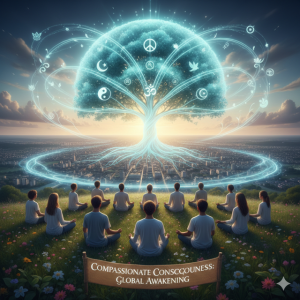
A Warning
AI safety engineer Mrinank Sharma has resigned from the multibillion-dollar artificial intelligence corporation Anthropic, declaring that “the world is falling apart and is in peril.” In leaving behind his career in AI development to become a poet and coach, Sharma is stepping away from the machinery of technological progress and into a life of creative human encounter.
His departure feels like both a personal awakening and a prophetic act — not an indictment of AI itself, but of the forces controlling it. Like fire, AI is neither good nor evil; it is a mirror of human intention, capable of creation or destruction, meaning or meaninglessness, healing or harm, life or death.
In his resignation letter, Sharma wrote: “Our wisdom must grow in equal measure to our capacity to affect the world, lest we face the consequences.” In this single sentence lies a truth so vital to our collective survival that, if embraced, it could alter the course of humanity.
Yet the question arises — can we truly make this shift toward wisdom before it is too late?
The Problem
Throughout history, humanity has been haunted by the same shadows: greed, grasping, the hunger for power, manipulation, prejudice, fanaticism, and divisive nationalism. The twentieth century saw two world wars, countless smaller conflicts, the threat of nuclear annihilation, genocides, revolutions drenched in blood, and accelerating environmental devastation.
The twenty-first century has not freed us from these wounds. We have witnessed new wars, invasions by dominant powers, terrorism, and ecological collapse now reaching the threshold of irreversibility.
The recently unsealed Epstein files have further exposed the intoxicating grip of institutionalized power — the unspeakable crimes born from a system sustained by patriarchal privilege, wealth, and corruption. These horrors are not isolated; they are symptoms of a deeper moral decay.
Meanwhile, a billionaire-led technology industry now holds sway over politics, economics, and the very narratives that shape our minds. The path toward awakening appears narrow. It sometimes seems that only catastrophe — whether climate collapse or the runaway emergence of artificial intelligence — could rupture our collective trance. Western culture teeters on the brink of spiritual exhaustion, having lost its sense of sacred meaning. And yet, I believe a different future still stirs beneath the surface — fragile, but possible.
Signs of Hope
Despite the darkness, I hold fast to hope. Humanity carries within it the seeds of divinity — an ancient spark woven into the fabric of our collective soul. When the time is right, that divine wisdom may once again awaken within us, spreading through each heart that chooses compassion over fear.
The psychologist and author Professor Paul Gilbert, founder of Compassion Focused Therapy (CFT), defines compassion as “a motive that emerges out of the evolution of caring behaviour — a mammalian-rooted motivational system. What turns caring into compassion is our human capacity for thought, empathy, and mindfulness.”
To act compassionately, then, is to engage the deepest intelligence available to us — the intelligence of the heart.
This awakening is already taking root across the world:
- In global initiatives like The Charter for Compassion and The Global Compassion Coalition
- In new psychotherapies such as Compassion Focused Therapy, Internal Family Systems, and the international Mindfulness Movement
- And in grass-roots efforts like Compassionate Communities, where ordinary people cultivate kindness as a collective practice
Imagine a humanity that gathers its scattered light through the lens of compassion — reasoning compassionately, feeling compassionately, speaking compassionately. Such a humanity could generate a field of consciousness powerful enough to transform not only personal suffering, but the systems that perpetuate it.
Through compassion, we reclaim meaning. Through compassion, we rediscover the sacred.
Those who commit to living compassion as an embodied discipline — a state of being rather than an ideal — may yet seed a contagion of love, wisdom, and visionary optimism strong enough to birth a new era.
A Call to Compassion
For the sake of the generations yet to come, I dedicate what remains of my life to cultivating the consciousness of compassion. My hope is that those walking a similar path will join in this shared vow — that together, we may help humanity rise from its own confusion, awaken its divine essence, and steer away from irreparable loss.
In the end, it may not be technology that saves us, nor progress, nor power — but the quiet, fierce light of compassion burning in awakened hearts.


